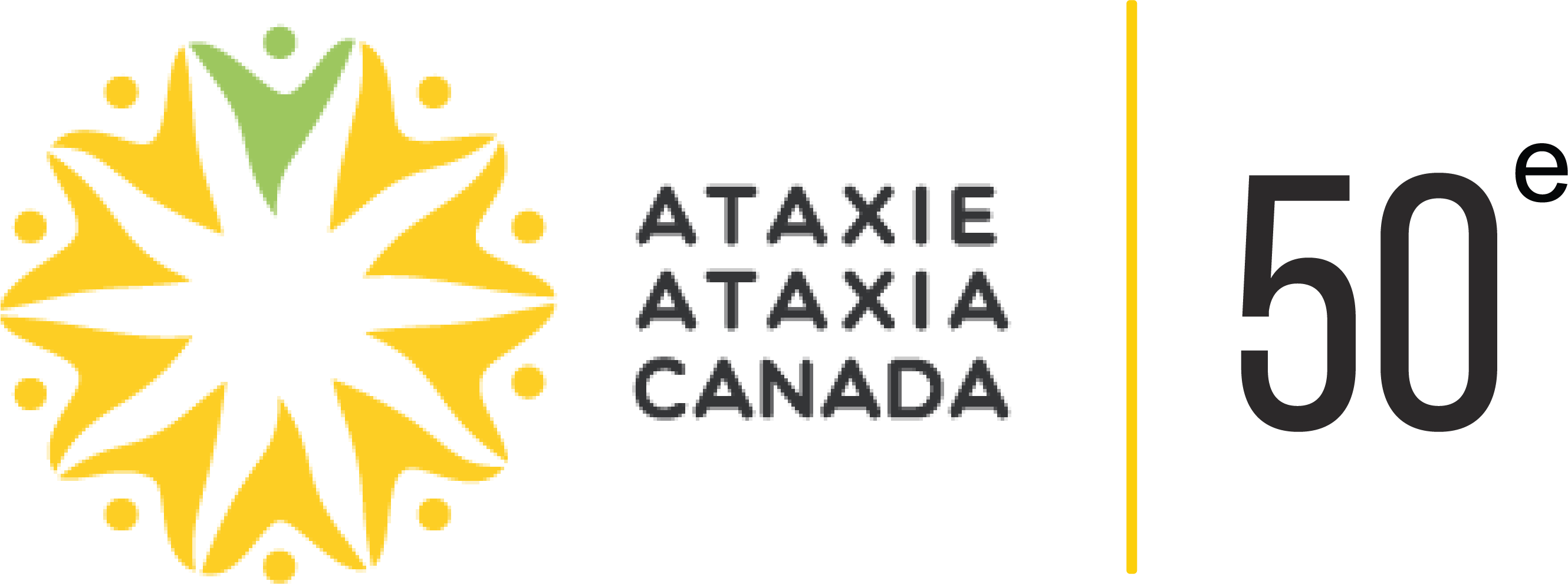The scientific research of Ataxia Canada – Claude St-Jean Foundation
Innovative therapies for hereditary ataxias – 2024 Announcement
Since its inception, Ataxia Canada has been committed to supporting research for the development of therapies targeting the causes and effects of various forms of ataxia. This mission remains at the heart of the administrators and members’ dedication to the foundation.
Ataxia Canada funds relevant research, primarily focused on genetic (recessive or dominant) and progressive ataxia. We are pleased to announce that Ataxia Canada, along with Génome Québec and Muscular Dystrophy Canada, recently unveiled the winning projects of the Innovative Therapies for Hereditary Ataxias competition during a webinar. Thank you to all participants in this webinar!
This initiative aims to encourage the discovery and development of new therapies while mobilizing the research ecosystem. The total investment amounts to $850,000, with the foundation funding over 50% of this amount.
Congratulations to the recipients!
 Nancy Braverman from the Research Institute of McGill University Health Centre –
Nancy Braverman from the Research Institute of McGill University Health Centre –
Gene therapy targeting the central nervous system to improve ataxia and neurodegeneration in a Pex16 mouse model.
 Éric Lécuyer and Pascal Chartrand from the Clinical Research Institute of Montreal –
Éric Lécuyer and Pascal Chartrand from the Clinical Research Institute of Montreal –
Determining the repertoires and therapeutic potential of RNA-binding proteins that undergo sequestration by toxic repeat RNA causing spinocerebellar ataxias.

Éric Samarut and Martine Tétreault from the Research Center of the University of Montreal Hospital Center –
Dissecting the pathogenic mechanisms of CANVAS (Cerebellar Ataxia with Neuropathy and Vestibular Areflexia Syndrome) to develop therapeutic strategies.
Ataxia excellence clinical research site- Montreal

The approximately $15 million in present value has been raised and invested in scientific research. We are right to ask ourselves what has been the use of all this money invested in medical research. Take a good look at this impressive list.
- Screening – Analysis of Canadian families afflicted with ataxia : relatives as well as afflicted persons in Quebec, in the Acadian peninsula [N.B.] − identification, analysis of the different symptoms and genetic cartography.
- Molecular genetics (Friedreich’s Ataxia [FA]; Charlevoix-Saguenay Ataxia [ARSACS]; SCA1;SCA2; SCA3)
- Genealogical studies of Quebecois families (genetic markers of FA and ARSACS).
- Study of cognitive troubles associated with ARSACS.
- Studies on mutant mice.
- Biochemistry – metabolism – patho-physiology of diabetes.
- Clinical projects (experimental trial of amantadine in collaboration with Italy, France and the United States).
- Maintaining FA clinics in the participating hospitals (Marie-Enfant, McGill, Chicoutimi, Quebec, Sherbrooke, Hôtel-Dieu of Montreal). Neurological follow-up.
- Prenatal services (consultation and diagnostic tests).
- Cardiologic and cardio-pulmonary evaluation and follow-up of patients afflicted with FA.
- Post-mortem study on the metabolism of iron on the level of the heart, and hepatic study;
- Metabolic, radiological and neurochemical research.
- Creation of a table of reference for Charlevoix-Saguenay spastic ataxia and Friedreich’s ataxia and a study of the families.
- International Workshop on FA. (2) Putting together the research work on ataxia of several participatory countries + International Symposium of the Research Centre of Neurological Sciences concerning the cerebellar functions.
- Neuro-psychological studies at the Hôtel-Dieu of Montreal on Friedreich patients, SCA1, SCA2, SCA3 and ARSACS, aiming to evaluate different functions of the nervous system such as : concentration, memory, language, attention, verbal and non-verbal memory, coordination, movement precision, etc.
- Multi-disciplinary approach on neurology, biochemistry, participation in the discovery of genes, orthopaedic cardiology, speech therapy, occupational therapy, social services and professional guidance for persons afflicted with ataxias.
- Bursary holders working with ataxic families on their genealogy and the symptoms of unidentified forms of ataxia.
Medical Equipment and Professional Services
- Computer program for data processing.
- Molecular probes.
- Technicians for pre-natal diagnoses.
- Mice.
Social Services
- General Assemblies.
- Answering questions on social networks, on the website or by telephone
- Establishment of a question and answer database on the most frequently asked questions (website)
- Orientation and referencing of different resources available
- Update of scientific advances on our website and social networks
Fundraisers
- Subscription campaign (stationery and stamps).
- Challenge ataxia – bike (4th edition) and walk
- Walks across Canada (Ontario, Saskatoon, Manitoba, etc.)
- Events organized by Foundation volunteers such as the Quebec City conference dinner (brunch in the past), the poker tournament, spaghetti dinners, etc.
Functioning of the Organization
- Salaries of three employees (removing the accountant) and the financial auditor at the end of each fiscal year
- Office supplies (stationery, stamps, printer, telephone, etc.
- Suppliers (graphic designer, donation management software, etc.)
Results
- Good identification of the symptoms of ataxia and good neuro-psychological and physiological knowledge.
- Greater visibility therefore better awareness (to be followed up on).
- Better knowledge of the means of transmission of several forms of ataxia (recessive and dominant).
- Identification of several forms of ataxia and their genes.
- Discovery of new forms of ataxia.
- Post-natal diagnosis of ARSACS and of FA.
- Increase in the number of participatory countries which are carrying out research.
- Better understanding of ataxia on all levels (symptomatic, chemical, biochemical, genetic, neurological, etc.)
- Greater screening.
Research Centres
- Clinical Research Institute of Montreal – IRCM.
- Marie-Enfant Hospital (Neuro-muscular diseases clinic).
- Royal Victoria Hospital (diabetes).
- CHUM of Sherbrooke (Dr. Bernard Lemieux) tissue bank.
- Sainte-Justine Hospital.
- Montreal Neurological Institute (FA cerebellar metabolism).
- Enfant-Jésus Hospital of Quebec.
- McGill University (ataxia clinic).

